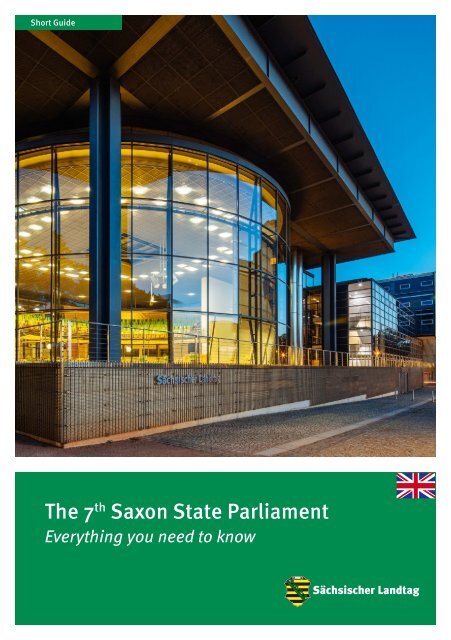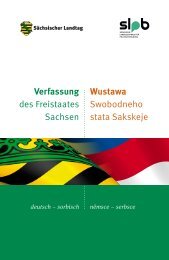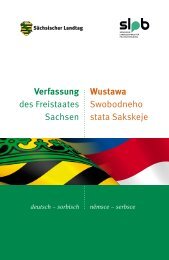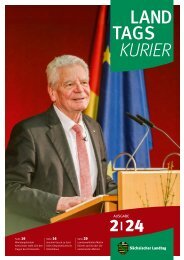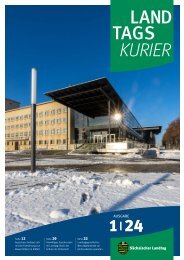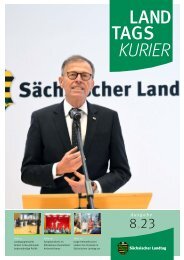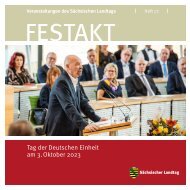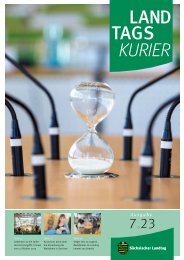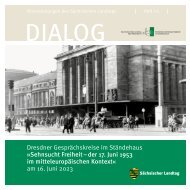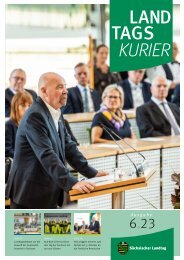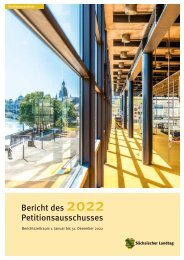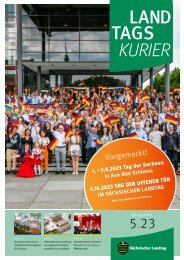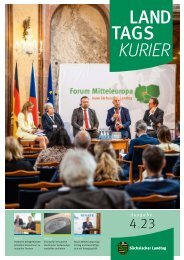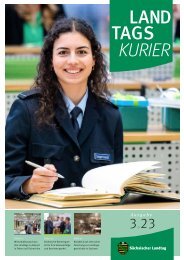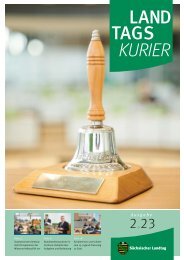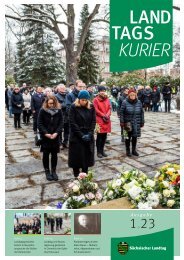Der Sächsische Landtag - Kurzführer (englisch)
The Saxon State Parliament - Everything you need to know
The Saxon State Parliament - Everything you need to know
You also want an ePaper? Increase the reach of your titles
YUMPU automatically turns print PDFs into web optimized ePapers that Google loves.
Short Guide<br />
The 7 th Saxon State Parliament<br />
Everything you need to know
Contents<br />
Foreword by the President<br />
of the State Parliament.................................... 3<br />
Who sits in the State Parliament?<br />
The election of the 7th Saxon<br />
State Parliament................................................ 4<br />
Composition of the Parliament...................... 6<br />
How is the State Parliament organised?<br />
The President and Vice Presidents............. 10<br />
The Presidium...................................................11<br />
The Parliamentary Party Proups.................. 12<br />
The Working Groups....................................... 14<br />
The Committees............................................... 16<br />
Plenum............................................................... 18<br />
The members of the State Parliament.......20<br />
Seating arrangements in the plenum........26<br />
CDU Parliamentary Group.............................28<br />
AfD Parliamentary Group..............................30<br />
DIE LINKE Parliamentary Group...................32<br />
BÜNDNISGRÜNE Parliamentary Group......34<br />
SPD Parliamentary Group.............................36<br />
What does the State Parliament do?<br />
Passing laws.....................................................38<br />
Electing representatives................................39<br />
What does the State Parliament do?.........40<br />
Scrutinising the State Government............40<br />
Articulating opinions...................................... 41<br />
How can people participate?<br />
Submitting petitions......................................42<br />
Introducing bills..............................................43<br />
Getting informed.............................................44<br />
Taking a look inside the Parliament...........46<br />
Events for schools........................................... 47<br />
Saxony in Europe.............................................48<br />
State Parliament contact details.................50
Foreword by the President of the State Parliament<br />
“ALL STATE<br />
AUTHORITY IS<br />
DERIVED FROM<br />
THE PEOPLE.”<br />
Saxon Constitution,<br />
Article 3(1)<br />
Dear Reader,<br />
I am glad that you are interested in the Saxon<br />
State Parliament. This information booklet<br />
will tell you all you need to know about the<br />
Saxon State Parliament and its composition<br />
in the 7 th legislative term.<br />
“All state authority is derived from the<br />
people.” This statement from the Saxon<br />
Constitution reminds us that parliamentary<br />
democracy, and Saxony as a constitutional<br />
state, were restored thanks to the peaceful<br />
revolution of 1989. It also reminds us that<br />
parliamentary democracy allows the greatest<br />
amount of freedom, but is also the most<br />
difficult form of government. It depends on<br />
the active involvement of its citizens.<br />
A prerequisite for this involvement is<br />
knowledge about the workings of democratic<br />
organisations and institutions. This short<br />
guide provides you with an overview of the<br />
composition and functions of the Saxon<br />
State Parliament. As you read, you will learn<br />
all about the work of the Parliament, and<br />
about how its members formulate policy for<br />
Saxony.<br />
I hope this booklet will help improve your<br />
understanding of the Saxon State Parliament.<br />
But do get involved as well! Our state needs<br />
civic engagement and society needs everyone<br />
to participate. This booklet also sets out<br />
what opportunities there are for participating<br />
in politics and submitting petitions, and<br />
explains citizen lawmaking.<br />
Dr. Matthias Rößler<br />
President of the Saxon State Parliament
Who sits in the State Parliament?<br />
40<br />
35<br />
30<br />
25<br />
20<br />
15<br />
10<br />
5<br />
0<br />
% 32.1 10.4 7.7 27.5 8.6 4.5 3.4 5.8<br />
CDU<br />
DIE LINKE SPD AfD BÜNDNIS 90/<br />
DIE GRÜNEN<br />
FDP<br />
FREIE<br />
WÄHLER<br />
OTHER<br />
The election of the 7 th Saxon State Parliament<br />
The Saxon State Parliament is the only constitutional<br />
body in the Free State of Saxony<br />
that is directly elected by the people. Members<br />
of the State Parliament are elected by<br />
secret ballot in direct, free elections on the<br />
basis of universal and equal suffrage. Elections<br />
to the Saxon State Parliament are held<br />
every five years. Since the restoration of the<br />
Free State, there have been seven elections<br />
to the State Parliament.<br />
On 1 September 2019, almost 3.3 million<br />
Saxons were asked to elect a new State<br />
Parlia ment. Two thirds of those eligible to<br />
vote (66.5%) took the opportunity to have a<br />
say in the composition of the 7th Saxon<br />
State Parliament. This was the highest voter<br />
turnout since 1990.<br />
Who is allowed to vote?<br />
All German citizens whose main residence is<br />
in Saxony and who are aged 18 or over on<br />
polling day are entitled (with a few exceptions)<br />
to participate in elections to the Saxon<br />
State Parliament and cast their vote.<br />
Why vote?<br />
Parliamentary elections are a key aspect of<br />
political participation in every democracy.<br />
By casting their vote, citizens play an active<br />
role in the political decision-making process<br />
and determine the political composition of the<br />
Parliament. Take advantage of the opportunity<br />
to shape the political development of<br />
the Free State of Saxony.<br />
Five parties were elected to the State<br />
Parliament: the CDU, the AfD, DIE LINKE,<br />
BÜNDNIS 90/DIE GRÜNEN and the SPD.<br />
Chart: final official result according to the Saxon state<br />
returning officer (as at 13/09/2019), order of parties<br />
based on their showing in the 2014 election<br />
| 4 |
How does the election work?<br />
Voters have two votes:<br />
1 Candidate<br />
Party<br />
2 Candidate<br />
Party<br />
3 Candidate<br />
Party<br />
2 VOTES<br />
Ballot paper<br />
You have 2 votes<br />
1 vote here<br />
Direct vote<br />
Direct candidate<br />
for your constituency<br />
60 seats for winners<br />
of direct votes<br />
Distribution of seats in the<br />
7 th Saxon State Parliament<br />
2019<br />
1 vote here<br />
Party list vote<br />
Party 1<br />
Candidate<br />
Party 2<br />
Candidate<br />
Party 3<br />
Candidate<br />
Saxon party list<br />
60 seats for parties<br />
in accordance<br />
with their lists<br />
Direct vote to elect a constituency representative:<br />
half of the members are directly<br />
elected by the 60 constituencies. The candidate<br />
receiving the most direct votes in a<br />
constituency is elected to the Saxon State<br />
Parliament.<br />
List vote to elect party list representatives.<br />
The other half are elected on the basis<br />
of state lists, which are drawn up by the parties<br />
in advance. The list votes have the greatest<br />
influence on the distribution of seats, since<br />
these are used to calculate the proportional<br />
composition of the State Parliament.<br />
Only parties receiving at least 5% of the votes<br />
cast (‘5 per cent clause’) or winning directly<br />
elected seats in at least two constituencies<br />
(‘alternative clause’) are considered when<br />
seats are allocated.<br />
Seats from ... Total CDU AfD DIE LINKE BÜNDNISGRÜNE SPD<br />
Direct votes 60 41 15 1 3 0<br />
List votes 59 4 23 13 9 10<br />
Total 119 45 38 14 12 10<br />
| 5 |
Who sits in the State Parliament?<br />
Composition of the Parliament<br />
The Saxon State Parliament is on principle<br />
made up of 120 members. Since one of the<br />
seats obtained by the AfD could not be<br />
allocated, the 7th Saxon State Parliament<br />
consists of 119 members instead of 120.<br />
The 119 members of the State Parliament<br />
are divided into five parliamentary party<br />
groupings. Seats are allocated to the parties<br />
based on the number of list votes they obtain<br />
in the state election.<br />
14<br />
10<br />
12<br />
SPD<br />
DIE LINKE<br />
45<br />
CDU<br />
BÜNDNISGRÜNE<br />
119<br />
Allocation of seats<br />
The CDU constitutes the largest parliamentary<br />
group, with 32.1% of the party list votes and<br />
45 seats, followed by the AfD with 38 seats<br />
(27.5%). DIE LINKE won 14 seats (10.4%),<br />
and BÜNDNISGRÜNE 12 seats (8.6%). The<br />
SPD is the smallest parliamentary group with<br />
10 seats (7.7%).<br />
Three of the 119 members of the State Parliament<br />
have been members from the very beginning:<br />
Andrea Dombois, Dr. Matthias Rößler and<br />
Marko Schiemann (all CDU) have<br />
held parliamentary seats since<br />
1990. By contrast, 50 newcomers<br />
have won seats<br />
38 in the State Parliament<br />
for the first time.<br />
AfD<br />
| 6 |
35 10<br />
5 7<br />
77.8 %<br />
22.2 % 34 4<br />
41.7 % 58.3 %<br />
7 3<br />
CDU<br />
89.5 % 10.5 %<br />
70 % 30 %<br />
5 9<br />
BÜNDNISGRÜNE<br />
SPD<br />
DIE LINKE<br />
86<br />
33<br />
AfD<br />
35.7 % 64.3 %<br />
72.3 %<br />
27.7 %<br />
Gender distribution<br />
The gender distribution in the State Parliament<br />
is 33 women to 86 men. Women thus make<br />
up 27.7% of members. There are significant<br />
differences between the parliamentary party<br />
groups. In the DIE LINKE group, women are<br />
in the majority, at 64.3%. In the BÜNDNIS-<br />
GRÜNE group, women account for 58.3% of<br />
members. In the SPD and CDU Parliamentary<br />
Groups, women are in the minority at 30% and<br />
22.2% respectively. The AfD Parliamentary<br />
Group also has a minority of women, at 10.5%.<br />
Age distribution<br />
The average age of members of the State<br />
Parliament is 48, with the greatest number<br />
coming from the 41 to 50 age group. At 69,<br />
Svend-Gunnar Kirmes (CDU) is the oldest<br />
member of the State Parliament. 22-yearold<br />
Lucie Hammecke (BÜNDNISGRÜNE) is<br />
the Parliament’s youngest member.<br />
Age Jahre<br />
20 – 30 1 22<br />
5<br />
31 – 40<br />
41 – 50<br />
7 5 5 4 4<br />
18 14 5 3 4<br />
25<br />
44<br />
Durchschnittsalter in Jahren<br />
CDU Average age 50in years<br />
AfD<br />
CDU<br />
50<br />
50<br />
AfD 50<br />
DIE LINKE 41<br />
DIE LINKE 41<br />
BÜNDNISGRÜNE BÜNDNISGRÜNE 42<br />
42<br />
51 – 60<br />
61 – 70<br />
12 13 2 2 2<br />
8 5 1<br />
SPD SPD 46<br />
46<br />
31<br />
Total 48<br />
Durchschnittsalter im <strong>Sächsische</strong>n <strong>Landtag</strong><br />
14 48<br />
(As at: 01.02.2020)<br />
| 7 |
| 8 |
How is the State Parliament organised?<br />
The President and Vice Presidents<br />
The President of the State Parliament is the<br />
highest-ranking representative of the State<br />
Parliament. The President represents the<br />
State Parliament to the outside world, and<br />
is therefore the face and voice of the Parliament.<br />
He or she performs his/her duties in<br />
a non-partisan and just manner.<br />
The President and his or her deputies, the<br />
Vice Presidents, are elected by the State<br />
Parliament at the beginning of each legislative<br />
term. Since 2009, the office of President<br />
has been held by Dr. Matthias Rößler. He is<br />
supported by three Vice Presidents.<br />
Duties<br />
THE PRESIDENT<br />
▶ convenes and leads sessions of the State<br />
Parliament, ensuring that the Rules of<br />
Procedure are adhered to. He is assisted<br />
during each session by two recording<br />
clerks.<br />
▶ protects the reputation and laws of the<br />
State Parliament,<br />
▶ controls who can enter the State Parliament<br />
building and exercises police powers there,<br />
▶ manages the financial affairs of the<br />
State Parliament in accordance withthe<br />
Budget Act,<br />
▶ is responsible for the State Parliament’s<br />
official communications, e. g. with<br />
the State Government.<br />
President of the Saxon<br />
State Parliament<br />
Dr. Matthias Rößler, CDU<br />
First Vice President<br />
Andrea Dombois, CDU<br />
Second Vice President<br />
André Wendt, AfD<br />
Third Vice President<br />
Luise Neuhaus- Wartenberg,<br />
DIE LINKE
The Presidium<br />
The Presidium is the State Parliament’s<br />
central coordinating and steering body. It<br />
assists the President with management of<br />
parliamentary business and administration<br />
of the State Parliament.<br />
The Presidium usually meets on the Wednesday<br />
of the week before plenary week.<br />
The Presidium has 21 members.<br />
Duties<br />
THE PRESIDIUM<br />
▶ draws up the schedule for plenary sessions,<br />
which sets out the days on which plenary<br />
sessions will take place, for example.<br />
▶ sets the agenda for plenary sessions<br />
and agrees the allocation of speaking<br />
time in the plenum,<br />
▶ controls the distribution of rooms in<br />
the State Parliament building,<br />
▶ establishes preliminary estimates for<br />
the State Parliament’s budget,<br />
▶ determines procedures for appointing<br />
and removing State Parliament officials.<br />
PRESIDENT OF THE STATE PARLIAMENT<br />
First Vice President Second Vice President Third Vice President<br />
5 Parliamentary party<br />
group chairs<br />
12 other members<br />
of parliament<br />
| 11 |
How is the State Parliament organised?<br />
The Parliamentary Party Groups<br />
Parliamentary party groups play a key role<br />
in the day-to-day activities of the Parliament.<br />
They play a key role in political decisionmaking<br />
and have considerable influence on<br />
the work of the Parliament. This is why they<br />
are often referred to as the ‘parties in parliament’.<br />
Formation of a parliamentary party group<br />
in the State Parliament requires a minimum<br />
of six members of the same party. There are<br />
five parliamentary party groups in the 7 th<br />
Saxon State Parliament: the CDU Parliamentary<br />
Group (45 seats), the AfD Parliamentary<br />
Group (38 seats), the DIE LINKE Parliamentary<br />
Group (14 seats), the BÜNDNISGRÜNE<br />
Parliamentary Group (12 seats) and the SPD<br />
Parliamentary Group (10 seats).<br />
These are headed by the chairs of the<br />
parliamentary party groups, who set policy<br />
guidelines and represent their parliamentary<br />
party group to the public. The activities of<br />
parliamentary party groups are regulated by<br />
parliamentary secretaries. Groups also come<br />
to agreements amongst themselves, for exam-<br />
Duties Aufgaben<br />
THE PARLIAMENTARY PARTY GROUPS<br />
▶ contribute to political decision-making,<br />
▶ can introduce bills and motions in the<br />
State Parliament,<br />
▶ try to work towards shared political<br />
interests and objectives,<br />
▶ can form coalitions, i. e. cooperate with each<br />
other in order to form a majority government<br />
or work in opposition to the government,<br />
▶ determine the course of debate in the<br />
plenum by deciding who will speak<br />
on behalf of the parliamentary party<br />
group and how they will respond to<br />
parliamentary initiatives proposed<br />
by the other parliamentary party groups<br />
and the State Government,<br />
▶ contribute to decisions on appointments<br />
to various roles by bringing forward<br />
proposals, for example, on who to elect<br />
as President and Vice Presidents.<br />
ple, on approaches to parliamentary debates<br />
and ensuring that their own parliamentary<br />
party group holds the line prior to critical votes.<br />
| 12 |
Chair of the Parliamentary<br />
Party Group<br />
Christian Hartmann<br />
Parliamentary<br />
Secretary<br />
Sören Voigt<br />
CDU Parliamentary Group<br />
Bernhard-von-Lindenau-Platz 1<br />
01067 Dresden<br />
Tel. +49 (0)351 493-5611<br />
cdu-pressestelle@slt.sachsen.de<br />
www.cdu-sachsen-fraktion.de<br />
Chair of the Parliamentary<br />
Party Group<br />
Jörg Urban<br />
Parliamentary<br />
Secretary<br />
Jan-Oliver Zwerg<br />
AfD Parliamentary Group<br />
Bernhard-von-Lindenau-Platz 1<br />
01067 Dresden<br />
Tel. +49 (0)351 493-4201<br />
info@afd-fraktion-sachsen.de<br />
www.afd-fraktion-sachsen.de<br />
Chair of the Parliamentary<br />
Party Group<br />
Rico Gebhardt<br />
Parliamentary<br />
secretary<br />
Sarah Buddeberg<br />
DIE LINKE Parliamentary Group<br />
Bernhard-von-Lindenau-Platz 1<br />
01067 Dresden<br />
Tel. +49 (0)351 493-5800<br />
linksfraktion@slt.sachsen.de<br />
www.linksfraktionsachsen.de<br />
Chair of the Parliamentary<br />
Party Group<br />
Franziska Schubert<br />
Parliamentary<br />
Secretary<br />
Valentin Lippmann<br />
BÜNDNISGRÜNE Parliamentary Group<br />
Bernhard-von-Lindenau-Platz 1<br />
01067 Dresden<br />
Tel. +49 (0)351 493-4800<br />
gruene-fraktion@slt.sachsen.de<br />
www.gruene-fraktion-sachsen.de<br />
Chair of the Parliamentary<br />
Party Group<br />
Dirk Panter<br />
Parliamentary<br />
secretary<br />
Sabine Friedel<br />
SPD Parliamentary Group<br />
Bernhard-von-Lindenau-Platz 1<br />
01067 Dresden<br />
Tel. +49 (0)351 493-5700<br />
kontakt@spd-fraktion-sachsen.de<br />
www.spd-fraktion-sachsen.de<br />
| 13 |
How is the State Parliament organised?<br />
The Working Groups<br />
Not all members of a parliamentary party<br />
group can have detailed knowledge of every<br />
political issue. The parliamentary party<br />
groups therefore form working groups to<br />
deal with different policy areas.<br />
Working groups bring together the expertise<br />
of specialist members of parliamentary party<br />
groups to address specific issues. This ensures<br />
that parliamentary party group experts are<br />
well prepared for standing committee meetings<br />
and plenary sessions. However, their<br />
decisions must always be approved by the<br />
entire parliamentary party group.<br />
Duties<br />
THE WORKING GROUPS<br />
▶ prepare positions on specific issues<br />
for their parliamentary party groups,<br />
▶ formulate political positions on their<br />
areas of work,<br />
▶ evaluate issues within their specific field,<br />
▶ prepare for committee meetings<br />
in terms of content and strategy,<br />
▶ prepare plenary session agenda items<br />
that fall within their area of work,<br />
▶ keep in touch with organisations and<br />
interest groups within their area of<br />
responsibility.<br />
The number of working groups a parliamentary<br />
party group has is closely linked to its<br />
size. The greater the number of members<br />
within a parliamentary party group, the likelier<br />
it is that it will be able to form separate<br />
working groups for individual policy areas.<br />
| 14 |
Working groups and<br />
their chairpersons<br />
CDU:<br />
Constitutional and Legal<br />
Affairs, Democracy, Europe<br />
and Equal Opportunities<br />
Martin Modschiedler<br />
Budget and Finance<br />
Georg-Ludwig von Breitenbuch<br />
Schools and Education<br />
Holger Gasse<br />
Business, Employment<br />
and Transport<br />
Jan Hippold<br />
Energy, Climate Change,<br />
Environment and Agriculture<br />
Andreas Heinz<br />
Domestic Policy and Sport<br />
Rico Anton<br />
Social Welfare and Community<br />
Cohesion<br />
Alexander Dierks<br />
Science, Higher Education,<br />
Media, Culture and Tourism<br />
Oliver Fritzsche<br />
Regional Development<br />
Ronny Wähner<br />
Petitions<br />
Stephan Hösl<br />
Rules of Procedure and<br />
Immunity Matters<br />
Dr. Christiane Schenderlein<br />
1 st Investigation Committee<br />
Svend-Gunnar Kirmes<br />
AfD:<br />
Constitutional and Legal<br />
Affairs, Democracy, Europe<br />
and Equal Opportunities<br />
Alexander Wiesner<br />
Domestic Policy and Sport<br />
Lars Kuppi<br />
Social Welfare and<br />
Community Cohesion<br />
Doreen Schwietzer<br />
Education and Science<br />
Dr. Rolf Weigand<br />
Budget, Finance and<br />
Regional Development<br />
André Barth<br />
Agriculture, Energy,<br />
Environment and<br />
Conservation<br />
Jörg Dornau<br />
Business, Employment<br />
and Transport<br />
Mario Beger<br />
Media, Culture and<br />
Tourism<br />
Thomas Kirste<br />
DIE LINKE:<br />
Democratic Society<br />
Kerstin Köditz<br />
Sustainable Development<br />
Marco Böhme<br />
Public Services<br />
Franz Sodann<br />
BÜNDNISGRÜNE:<br />
Business, Transport<br />
and Social Welfare<br />
Kathleen Kuhfuß<br />
Domestic Policy, Legal Affairs<br />
and Democracy<br />
Lucie Hammecke<br />
Education, Science<br />
and Culture<br />
Dr. Claudia Maicher<br />
Environment, Agriculture,<br />
Regional Development and<br />
Finance<br />
Dr. Daniel Gerber<br />
SPD:<br />
Employment, Regional<br />
Development, Finance,<br />
Domestic Policy<br />
Henning Homann<br />
Social Welfare, Education,<br />
Science, Justice<br />
Hanka Kliese<br />
| 15 |
How is the State Parliament organised?<br />
The Committees<br />
The State Parliament forms committees for<br />
the duration of each legislative term. These<br />
cover all of the policy fields for which the<br />
state legislature is responsible. Politicians<br />
with special expertise from all parliamentary<br />
party groups sit on the committees and provide<br />
thorough and detailed advice on individual<br />
political issues.<br />
Committees can be<br />
▶ standing committees<br />
(select committees, other standing<br />
committees) or<br />
▶ temporary committees<br />
(investigation committees,<br />
committees of inquiry)<br />
Duties Aufgaben<br />
THE COMMITTEES<br />
▶ act as preparatory bodies, making<br />
recommendations to the State Parliament<br />
on submissions referred to them<br />
(e. g. bills, motions),<br />
▶ provide specialist and political input<br />
to prepare issues for decision in the<br />
plenum,<br />
▶ can hold public hearings with experts<br />
(select committees),<br />
▶ have the right of initiative in relation<br />
to other issues within their area of<br />
competency,<br />
▶ can put questions to the State<br />
Government.<br />
Parliamentary party groups are represented<br />
on committees in proportion to their number<br />
of seats in the State Parliament. The number<br />
of committee chairpersons drawn from each<br />
group also reflects the group's strength in<br />
the State Parliament.<br />
| 16 |
The standing committees and their chairpersons<br />
Committee for<br />
Domestic Policy<br />
and Sport<br />
Ronald Pohle (CDU)<br />
Budget and Finance<br />
Committee<br />
Holger Hentschel (AfD)<br />
Committee for Science,<br />
Higher Education,<br />
Media, Culture and<br />
Tourism<br />
Dr. Claudia Maicher<br />
(BÜNDNISGRÜNE)<br />
Committee for<br />
Regional Development<br />
André Barth (AfD)<br />
Committee for Schools<br />
and Education<br />
Christopher Hahn (AfD)<br />
Committee for Energy,<br />
Climate Change,<br />
Environment and<br />
Agriculture<br />
Ines Springer (CDU)<br />
Committee for Constitutional<br />
and Legal Affairs,<br />
Democracy, Europe and<br />
Equal Opportunities<br />
Marko Schiemann (CDU)<br />
Committee for<br />
Business, Employment<br />
and Transport<br />
Ines Saborowski (CDU)<br />
Investigation committees<br />
Committee for Social<br />
Welfare and Community<br />
Cohesion<br />
Susanne Schaper<br />
(DIE LINKE)<br />
Other standing committees<br />
Appraisal Committee<br />
Committee for Rules<br />
of Procedure and<br />
Immunity Matters<br />
Roland Walter Hermann<br />
Ulbrich (AfD)<br />
Petitions Committee<br />
Simone Lang (SPD)<br />
Election Scrutiny<br />
Committee<br />
Martin Modschiedler<br />
(CDU)<br />
The State Parliament is able to form temporary<br />
committees, including, in particular,<br />
investigation committees. According to the<br />
Constitution of the Free State of Saxony, a<br />
motion by one fifth of the members of the<br />
State Parliament is required to set up an<br />
investigation committee. This key minority<br />
right is exercised primarily by the opposition<br />
to investigate potential political or administrative<br />
malpractice or possible misconduct<br />
on the part of politicians.<br />
1 st Investigation Committee<br />
“Involvement of the State<br />
Government in the wilfully<br />
unlawful reduction of the<br />
AfD state list”<br />
Lars Rohwer (CDU)<br />
| 17 |
How is the State Parliament organised?<br />
Plenum<br />
The plenum is the plenary assembly of all<br />
the members of the State Parliament. All<br />
members generally meet for two days each<br />
month in the plenary chamber of the Saxon<br />
State Parliament in Dresden. No plenary<br />
sessions are held when Parliament is not<br />
sitting (e.g. summer recess).<br />
Proceedings<br />
Plenary sessions generally begin at 10 am<br />
and run until the evening, or sometimes even<br />
into the night. Plenary sessions are public<br />
and are led by the President of the State<br />
Parliament or one of his deputies.<br />
Media representatives, citizens and registered<br />
visitor groups may observe sessions<br />
from the gallery. Interjections such as<br />
heckling or applause are not permitted.<br />
The State Parliament live-streams plenary<br />
sessions on its website.<br />
Duties<br />
THE MEMBERS OF THE<br />
STATE PARLIAMENT IN THE PLENUM<br />
▶ debate current issues,<br />
▶ vote on bills and motions,elect<br />
representatives to a range of bodies<br />
and offices (e. g. President of the<br />
State Parliament, Prime Minister),<br />
▶ put questions to members of the<br />
State Government,<br />
▶ bring forward their arguments publicly.<br />
The order of events is set out in the agenda,<br />
which is agreed in advance. Parliamentary<br />
party groups may not exceed their agreed<br />
speaking time.<br />
Votes are signalled by a gong that can be<br />
heard throughout the Parliament building.<br />
The purpose of this is to ensure that members<br />
are present in the plenary chamber in<br />
time to vote.<br />
| 18 |
Significance<br />
Members are familiar from prior discussion<br />
with the submissions that are debated and<br />
voted on in the plenum. The working groups,<br />
parliamentary party groups and standing<br />
committees give members the opportunity to<br />
work intensively on submissions in advance<br />
and to exchange views.<br />
The main purpose of the plenary sessions is<br />
therefore to publicly document and track the<br />
political decision-making process. It is here<br />
that the decisions prepared in the bodies,<br />
parliamentary party groups and committees<br />
are tracked and formally voted on. All parliamentary<br />
party groups also have the opportunity<br />
to present their political points of view<br />
to the general public.<br />
Seating arrangements<br />
Members of the State Parliament have their<br />
own personal seats and sit together in their<br />
parliamentary party group. The chair of the<br />
parliamentary party group and parliamentary<br />
secretary usually sit in the first row. To the<br />
right and left of the president of the session<br />
are the government benches, where the<br />
Prime Minister and his/her cabinet members<br />
sit during plenary sessions.<br />
The plenary chamber also includes seats for<br />
stenographers, who transcribe all of the<br />
speeches and any interjections, producing<br />
a verbatim record. Further seats are provided<br />
for the President of the Court of Auditors<br />
(PCA) and the Saxon Data Protection<br />
Commissioner (SDC).<br />
CDU<br />
BÜNDNISGRÜNE<br />
SPD<br />
AfD<br />
DIE LINKE<br />
State Government<br />
Stenographer<br />
Speaker<br />
President<br />
State Government<br />
PCA | SDC<br />
Parliamentary services<br />
Director<br />
| 19 |
How is the State Parliament organised?<br />
The members of the State Parliament<br />
The members of the State Parliament are<br />
representatives of the people, elected to<br />
their seats by the citizens of Saxony. As<br />
parliamentarians, they represent the entire<br />
population of the state of Saxony. At present,<br />
the Saxon State Parliament has 119 members.<br />
They have the designation ‘MdL’ (‘Mitglied<br />
des <strong>Landtag</strong>s’, meaning ‘member of<br />
the State Parliament’).<br />
Anyone wishing to stand as a candidate for<br />
election to the State Parliament must be<br />
aged 18 or over and have been resident in<br />
Saxony for at least 12 months (main residence).<br />
The aim of this is to ensure that<br />
prospective candidates have a good knowledge<br />
of the region and its people before<br />
they stand for election.<br />
Elections<br />
Representatives are elected to the State<br />
Parliament every five years by secret ballot<br />
in free and direct elections on the basis of<br />
universal and equal suffrage. They gain their<br />
seat either by winning their own constituency<br />
(direct seat) or as a result of their position on<br />
their party’s state list (list seat), which the<br />
parties draw up before the state elections.<br />
Representatives are elected to the Parliament<br />
by the voters (Wähler)<br />
| 20 |
Rights<br />
Members are bound only by their own conscience<br />
in the exercise of their office, not by<br />
instructions or orders.<br />
However, in practice, members often have<br />
to observe party discipline. This means that<br />
the parliamentary party group comes to an<br />
agreement prior to important votes on how<br />
all of its members will vote.<br />
Members of the State Parliament have immunity.<br />
They are thus exempt from criminal<br />
prosecution for the duration of their term of<br />
office. This even applies to statements they<br />
make in the State Parliament after their<br />
term of office has concluded. They also have<br />
the right to refuse to give evidence to investigatory<br />
authorities and courts.<br />
| 21 |
How is the State Parliament organised?<br />
The members of the State Parliament<br />
Parliamentary work<br />
At the seat of the State Parliament in Dresden,<br />
members focus primarily on parliamentary<br />
work. They take part in a wide range of consultations<br />
(plenary sessions, committee<br />
meetings, parliamentary group consultations,<br />
working group meetings), which also<br />
require preparatory and follow-up work, for<br />
example preparing speeches, reading written<br />
opinions and taking part in detailed<br />
discussions with colleagues.<br />
Constituency<br />
work<br />
Other<br />
activities as<br />
a member of<br />
parliament<br />
Parliamentary<br />
work<br />
Duties<br />
MEMBERS OF THE<br />
STATE PARLIAMENT<br />
▶ have a wide range of duties to perform.<br />
They function as important links between<br />
the citizens of Saxony and the decisions<br />
taken in the State Parliament, and<br />
play a key role in policy delivery.<br />
Constituency work<br />
In addition, members are key points of contact<br />
for citizens, businesses and associations<br />
across Saxony and in their constituencies.<br />
Most members have an office in their<br />
constituency (called a ‘Bürgerbüro’), where<br />
they hold regular surgeries and discuss issues<br />
with local people. This enables them to<br />
make citizens’ voices heard in the State<br />
Parliament and to explain Parliamentary debates<br />
and decisions to their constituents.<br />
| 22 |
PLENARY CYCLE<br />
In order to enable members to perform<br />
their diverse duties effectively, the meetings<br />
calendar sets out a structure with a<br />
different work focus for each individual<br />
week. The calendar distinguishes between<br />
plenary weeks, committee weeks, parliamentary<br />
party group weeks and constituency<br />
weeks, which rotate on a regular basis.<br />
2021<br />
SITZUNGSKALENDER<br />
7. Wahlperiode<br />
Other activities as a member of parliament<br />
Members of parliament have other responsibilities<br />
as part of their role, for instance<br />
within the parliamentary group or party,<br />
dealing with correspondence, travelling on<br />
behalf of the State Parliament, attending<br />
events and conferences, talking to media<br />
representatives, and other public engagements.<br />
REMUNERATION | SALARIES<br />
Members of the State Parliament are entitled<br />
to a level of remuneration that will ensure<br />
they are appropriately independent (salary).<br />
This comprises a basic salary (€5,943.50<br />
as at 1 August 2019) and a tax-exempt flat<br />
rate for expenses (€3,330.60 to €4,354.75<br />
as at 1 April 2020). The flat rate for expenses<br />
varies depending on the distance between<br />
a member’s primary residence and the<br />
seat of the State Parliament in Dresden.<br />
It covers, for example, constituency work,<br />
the costs of travelling to the State Parliament,<br />
and rent for the member’s constituency office.<br />
| 23 |
| 24 |
|
Seating arrangements<br />
in the plenum<br />
SDC | PCA<br />
State Government<br />
State Government<br />
Director |<br />
Recording clerk |<br />
Stenographer<br />
Saxon Data Protection Commissioner (SDC)<br />
President of the Saxon Court of Auditors (PCA)<br />
| 26 |
Parliamentary services<br />
State Government<br />
President | Recording clerk<br />
State Government<br />
Speaker<br />
| 27 |
Daniela<br />
Kuge<br />
Step<br />
Hös<br />
The CDU Parliamentary Group<br />
in the Saxon State Parliament<br />
Jörg<br />
Markert<br />
Dr. Christiane<br />
Schenderlein<br />
Ja<br />
Hippo<br />
Svend-Gunner<br />
Kirmes<br />
With 45 members, the<br />
CDU Parliamentary Group<br />
is the largest parliamentary<br />
party group in the State<br />
Parliament. The CDU has been<br />
the strongest parliamentary party<br />
group in the State Parliament<br />
since 1990, and has formed part<br />
of every government.<br />
Prof. Dr.<br />
Roland Wöller<br />
Thomas<br />
Schmidt<br />
Christian<br />
Piwarz<br />
Jörg<br />
Kiesewetter<br />
Michael<br />
Kretschmer<br />
Ingo<br />
Flemming<br />
Iris<br />
Firmenich<br />
Er<br />
Dietri<br />
Barbara<br />
Klepsch<br />
CDU Parliamentary Group<br />
Bernhard-von-Lindenau-Platz 1<br />
01067 Dresden<br />
Tel. +49 (0)351 493-5611<br />
cdu-pressestelle@slt.sachsen.de<br />
www.cdu-sachsen-fraktion.de<br />
Sebastian<br />
Gemkow<br />
W<br />
| 28 |
| 29 |<br />
Gerald<br />
Otto<br />
Dr. Stephan<br />
Meyer<br />
Christian<br />
Hartmann<br />
Dr. Matthias<br />
Rößler<br />
Andrea<br />
Dombois<br />
Geert<br />
Mackenroth<br />
Alexander<br />
Dierks<br />
Ines<br />
Springer<br />
Ronald<br />
Pohle<br />
Lars<br />
Rohwer<br />
ic<br />
ch<br />
Ines<br />
Saborowski<br />
Marko<br />
Schiemann<br />
Kay<br />
Ritter<br />
Oliver<br />
Fritzsche<br />
Ronny<br />
Wähner<br />
han<br />
l<br />
Rico<br />
Anton<br />
Andreas<br />
Heinz<br />
Martin<br />
Modschiedler<br />
Holger<br />
Gasse<br />
n<br />
ld<br />
Jan<br />
Löffler<br />
Georg-Ludwig<br />
v. Breitenbuch<br />
Sören<br />
Voigt<br />
Peter Wilhelm<br />
Patt<br />
Wolf-Dietrich<br />
Rost<br />
Patricia<br />
issel<br />
Andreas<br />
Nowak<br />
Kerstin<br />
Nicolaus<br />
Aloysius<br />
Mikwauschk<br />
Susan<br />
Leithoff
Jen<br />
Oberhoff<br />
The AfD Parliamentary Group<br />
in the Saxon State Parliament<br />
Roland Walter<br />
Hermann Ulbrich<br />
Roberto<br />
Kuhnert<br />
The AfD Parliamentary<br />
Group consists of<br />
38 members. The AfD first<br />
entered the Saxon State<br />
Parliament in 2014. It is the<br />
largest opposition parliamentary<br />
party group in this legislative<br />
session.<br />
Timo<br />
Schreyer<br />
Doreen<br />
Schwietzer<br />
Tobias<br />
Keller<br />
Holger<br />
Hentschel<br />
Jörg Steffen<br />
Kühne<br />
Frank<br />
Peschel<br />
Mario<br />
Kumpf<br />
AfD Parliamentary Group<br />
Bernhard-von-Lindenau-Platz 1<br />
01067 Dresden<br />
Tel. +49 (0)351 493-4201<br />
info@afd-fraktion-sachsen.de<br />
www.afd-fraktion-sachsen.de<br />
Mario<br />
Beger<br />
| 30 |
s<br />
ner<br />
Norbert Otto<br />
Mayer<br />
Sebastian<br />
Wippel<br />
Jan-Oliver<br />
Zwerg<br />
Jörg<br />
Urban<br />
André<br />
Wendt<br />
Dr. Rolf<br />
Weigand<br />
Dr. Joachim<br />
Michael Keiler<br />
Carsten<br />
Hütter<br />
Ivo<br />
Teichmann<br />
Thomas<br />
Thumm<br />
Torsten<br />
Gahler<br />
Hans-Jürgen<br />
Zickler<br />
Thomas<br />
Prantl<br />
René<br />
Hein<br />
Jörg<br />
Dornau<br />
Thomas<br />
Kirste<br />
Dietmar Frank<br />
Schaufel<br />
Gudrun<br />
Petzold<br />
Martina<br />
Jost<br />
Ulrich Willi<br />
Lupart<br />
André<br />
Barth<br />
Romy<br />
Penz<br />
Lars<br />
Kuppi<br />
Dr. Volker<br />
Dringenberg<br />
Wolfram<br />
Keil<br />
Christopher<br />
Hahn<br />
Alexander<br />
Wiesner<br />
| 31 |
The DIE LINKE Parliamentary Group<br />
in the Saxon State Parliament<br />
The DIE LINKE<br />
Parliamentary Group<br />
consists of 14 members.<br />
The DIE LINKE party has had<br />
representatives in the Saxon<br />
State Parliament since 1990.<br />
The parliamentary party group<br />
has always been in opposition.<br />
| 32 |<br />
DIE LINKE Parliamentary Group<br />
Bernhard-von-Lindenau-Platz 1<br />
01067 Dresden<br />
Tel. +49 (0)351 493-5800<br />
linksfraktion@slt.sachsen.de<br />
www.linksfraktionsachsen.de
Sarah<br />
Buddeberg<br />
Rico<br />
Gebhardt<br />
Marika Tändler-<br />
Walenta<br />
Susanne<br />
Schaper<br />
Luise Neuhaus-<br />
Wartenberg<br />
Marco<br />
Böhme<br />
Anna<br />
Gorskih<br />
Antje<br />
Feiks<br />
Kerstin<br />
Köditz<br />
Franz<br />
Sodann<br />
Nico<br />
Brünler<br />
Mirko<br />
Schultze<br />
Antonia<br />
Mertsching<br />
Juliane<br />
Nagel<br />
| 33 |
The BÜNDNISGRÜNE Parliamentary Group<br />
in the Saxon State Parliament<br />
The BÜNDNISGRÜNE<br />
Parliamentary Group<br />
entered the Saxon State<br />
Parliament with 12 members.<br />
BÜNDNISGRÜNE was represented<br />
in the 1st Saxon State Parliament,<br />
and has had representatives in<br />
every legislative session since<br />
2004. They joined the governing<br />
coalition, for the first time, in 2019.<br />
| 34 |<br />
BÜNDNISGRÜNE Parliamentary Group<br />
Bernhard-von-Lindenau-Platz 1<br />
01067 Dresden<br />
Tel. +49 (0)351 493-4800<br />
gruene-fraktion@slt.sachsen.de<br />
www.gruene-fraktion-sachsen.de
Valentin<br />
Lippmann<br />
Franziska<br />
Schubert<br />
Dr. Claudia<br />
Maicher<br />
Christin<br />
Melcher<br />
Gerhard<br />
Liebscher<br />
Kathleen<br />
Kuhfuß<br />
Petra<br />
Čagalj Sejdi<br />
Lucie<br />
Hammecke<br />
Ines<br />
Kummer<br />
Dr. Daniel<br />
Gerber<br />
Volkmar<br />
Zschocke<br />
Thomas<br />
Löser<br />
| 35 |
The SPD Parliamentary Group<br />
in the Saxon State Parliament<br />
With 10 members,<br />
the SPD is the smallest<br />
parliamentary party group<br />
in the State Parliament. The<br />
SPD has sent representatives<br />
to every State Parliament since<br />
1990, and has formed part of<br />
several governing coalitions,<br />
including since 2019 with the<br />
CDU and BÜNDNISGRÜNE.<br />
| 36 |<br />
SPD Parliamentary Group<br />
Bernhard-von-Lindenau-Platz 1<br />
01067 Dresden<br />
Tel. +49 (0)351 493-5700<br />
kontakt@spd-fraktion-sachsen.de<br />
www.spd-fraktion-sachsen.de
Sabine<br />
Friedel<br />
Dirk<br />
Panter<br />
Hanka<br />
Kliese<br />
Henning<br />
Homann<br />
Albrecht<br />
Pallas<br />
Holger<br />
Mann<br />
Frank<br />
Richter<br />
Volkmar<br />
Winkler<br />
Simone<br />
Lang<br />
Martin<br />
Dulig<br />
| 37 |
What does the State Parliament do?<br />
Passing laws<br />
The Saxon State Parliament decides on all<br />
legislation that falls within the jurisdiction<br />
of the Free State of Saxony. This includes, for<br />
example, schools and education, police law<br />
and the right to assembly, culture, media<br />
policy, and local government.<br />
Budget<br />
The members of the State Parliament adopt<br />
the state budget, which sets out the revenue<br />
and expenditure of the Free State of Saxony<br />
for a two-year period. A ban on new borrowing<br />
is laid down by the Saxon Constitution. This<br />
means that if more is invested in one area,<br />
savings must be made in another.<br />
Exceptions may be made to this ban in the<br />
event of natural disasters or in emergency<br />
circumstances (see Coronavirus Pandemic<br />
2020).<br />
§<br />
The Members of Parliamentary State<br />
people Parliament party group Government<br />
Bill<br />
President of the State Parliament<br />
First reading in the plenum or straight to committee<br />
Committee<br />
Second reading with vote<br />
Countersignature by the Prime Minister and<br />
the relevant State Minister<br />
Execution by the President of the State Parliament<br />
Promulgation<br />
Procedure<br />
Bills can be introduced in the Parliament by<br />
members, parliamentary party groups, the<br />
State Government or citizens. Before a law<br />
is passed, it must go through several legislative<br />
stages. The politicians on the relevant<br />
standing committee undertake intensive<br />
deliberations on the bill and any proposed<br />
amendments before finally presenting a<br />
re com mendation to Parliament.<br />
| 38 |
Electing representatives<br />
Not only do the members of the Saxon State<br />
Parliament elect their own representatives,<br />
such as the President and Vice Presidents,<br />
they also elect individuals to a large number<br />
of other posts.<br />
Prime Minister<br />
One of the most prominent appointments is<br />
that of the Prime Minister. The State Parliament<br />
elects the Prime Minister through a majority<br />
vote in a secret ballot of its members, without<br />
debate. The Prime Minister appoints and dismisses<br />
State Ministers and State Secretaries,<br />
as well as his or her own deputy. The State<br />
Government's legitimacy is thus derived solely<br />
from the State Parliament.<br />
status to the State Parliament and State<br />
Government. Its responsibilities include deciding<br />
how to interpret the Saxon Constitution<br />
in disputes between constitutional bodies,<br />
and on the compatibility of state laws with<br />
the Constitution.<br />
The State Parliament also elects the President<br />
of the Saxon Court of Auditors and the State<br />
Commissioners (the Saxon Commissioner for<br />
Foreigners’ Affairs, Saxon Commissioner for<br />
the Reappraisal of the SED Dictatorship, and<br />
Saxon Data Protection Commissioner).<br />
Saxon Constitutional Court<br />
The State Parliament elects the members of<br />
the Saxon Constitutional Court for a term of<br />
nine years each, on the basis of a two-thirds<br />
majority of its members. The Constitutional<br />
Court is a constitutional body with equal<br />
| 39 |
What does the State Parliament do?<br />
Scrutinising the State Government<br />
The Saxon State Parliament scrutinises the<br />
work of the State Government. This scrutiny is<br />
a key element of the parliamentary system of<br />
government. Traditionally, public scrutiny is<br />
conducted primarily by opposition parliamentary<br />
party groups. The State Government is required<br />
to answer to the State Parliament. A<br />
diverse range of instruments and procedures<br />
is available to the members of the State<br />
Parlia ment as part of this process, for example:<br />
Minor interpellations<br />
Minor interpellations are the most commonly<br />
used instrument. All members of the State<br />
Parliament can put questions to the State<br />
Government in written form. These questions<br />
must – with a few exceptions – be answered.<br />
Besides providing information to members,<br />
they also serve as a means of scrutinising the<br />
work of the State Government. During the<br />
6 th legislative term, this form of scrutiny was<br />
used over 15,000 times. Minor interpellations<br />
are most frequently used by members of the<br />
opposition.<br />
Questions to the State Government<br />
Members have the opportunity during each<br />
plenary week to question a member of the<br />
State Government in Parliament. The questioning<br />
takes place on the second day of<br />
each plenary week after the Current Affairs<br />
hour. A time slot of 45 minutes is allotted for<br />
this. The Prime Minister is questioned at least<br />
once a year.<br />
Investigation committees<br />
Investigation committees are a special type<br />
of parliamentary scrutiny. They are set up<br />
on the basis of a motion from one fifth of the<br />
members of the State Parliament to investigate<br />
specific matters whose clarification is<br />
in the public interest, including in particular<br />
malpractice. During the 2nd plenary session<br />
of the 7 th Saxon State Parliament, the 1st<br />
investigation committee, entitled “Involvement<br />
of the State Government in the ‘wilfully<br />
unlawful’ reduction of the AfD state list”, was<br />
set up on 30 October 2019.<br />
| 40 |
Articulating opinions<br />
Another important function of the State Parliament<br />
is to act as a public political forum for<br />
the Free State of Saxony. The aim is to give<br />
expression to as wide a range of opi n ions<br />
as possible here so as to contribute to<br />
the political decision-making process. The<br />
views of the citizens of Saxony should also<br />
be voiced in the Saxon State Parliament.<br />
Visitors’ gallery/Lobby<br />
Citizens, pre notified visitor groups and media<br />
representatives can observe plenary sessions<br />
from the visitors’ gallery. The gallery accommodates<br />
up to 150 people. Those in the visitors’<br />
gallery are forbidden from expressing<br />
views whether positive or negative, and from<br />
applauding. The State Parliament can vote by<br />
a two-thirds majority to exclude the public<br />
in specific cases.<br />
The lobby in front of the plenary chamber<br />
serves as a meeting point for members of<br />
parliament, members of the State Government<br />
and journalists for discussions and interviews.<br />
Plenary session broadcasts<br />
If you do not have time to visit the State<br />
Parliament, you can keep up to date on the<br />
latest political disputes, or follow plenary<br />
session broadcasts, in the media.<br />
▶ Web: The State Parliament live-streams<br />
all plenary sessions on its website.<br />
▶ Audio: Follow plenary sessions via live<br />
audio stream on MDR SACHSEN EXTRA<br />
(DAB+).<br />
▶ Local television: Sachsen Fernsehen<br />
broadcasts Current Affairs hours (part of<br />
the plenary sessions) in its programming<br />
on the afternoon of the relevant plenary<br />
session.<br />
Videos of all plenary sessions from the current<br />
and previous legislative terms are available<br />
on the State Parliament's website. You can<br />
also search here for speeches by individual<br />
members of parliament.<br />
| 41 |
How can people participate?<br />
Submitting petitions<br />
The right of petition is a valuable asset and<br />
a fundamental democratic right, which is<br />
exercised frequently by Saxon citizens. The<br />
Saxon State Parliament Petitions Committee<br />
examines citizens’ requests and complaints<br />
and attempts to provide solutions.<br />
You can bring your problems and concerns<br />
to the Petitions Committee regardless of<br />
whether the issue in question affects only<br />
one person or is supported by thousands of<br />
people.<br />
ARTICLE 35 OF THE SAXON CONSTITUTION<br />
“Every person has the right to address<br />
requests and complaints in writing to<br />
the competent authorities and to the<br />
Parliament individually or in association<br />
with others. They also have the right<br />
to receive a reasoned response within<br />
a reasonable period of time.”<br />
Petitions Committee<br />
With 28 members, the Petitions Committee is<br />
the largest committee in the State Parliament.<br />
This highlights the level of priority that the<br />
Parliament attaches to citizens’ concerns.<br />
The committee can, for example, request<br />
opinions from the State Government, hold<br />
hearings with petitioners or experts, examine<br />
records and undertake on-site visits.<br />
Petitions provide valuable input to the work<br />
of the members of the State Parliament because<br />
they<br />
▶ convey the concerns and hardships that<br />
people are facing,<br />
▶ reveal gaps in legislation or regulations,<br />
and<br />
▶ reflect people’s views on current political<br />
issues.<br />
Petitions can be submitted easily direct to<br />
the Parliament in writing, or via an online<br />
petition.<br />
| 42 |
Introducing bills<br />
Citizens of Saxony can introduce bills to<br />
Parliament directly by means of a Volksantrag<br />
or ‘people’s motion’. This motion must be<br />
signed by at least 40,000 individuals who are<br />
eligible to vote, and must include a well<br />
founded legislative proposal. The procedure<br />
is set out in the Saxon Constitution, the<br />
Rules of Procedure of the State Parliament,<br />
and in a specific statute.<br />
If a Volksantrag is not accepted in the plenum,<br />
it may still be passed by means of a referendum<br />
petition and a referendum.<br />
VOLKSANTRAG Well founded legislative proposal with<br />
at least 40,000 signatures<br />
PRESIDENT OF THE STATE PARLIAMENT<br />
checks admissibility<br />
admissible<br />
inadmissible<br />
X<br />
PARLIAMENT<br />
processes Volksantrag under<br />
usual procedures<br />
if rejected<br />
if approved<br />
REFERENDUM PETITION<br />
Aim: to trigger a referendum!<br />
450,000 signatures<br />
sufficient<br />
signatures<br />
REFERENDUM<br />
after a period of min. three and<br />
max. six months<br />
fewer<br />
signatures<br />
majority<br />
against<br />
X<br />
majority in favour<br />
LAW ENTERS<br />
INTO FORCE<br />
| 43 |
www.landtag.sachsen.de<br />
Seite 3:<br />
Landesausstellung gibt<br />
Einblicke in Sachsens<br />
Industriekultur<br />
TEIL<br />
1<br />
Seite 12:<br />
Konferenz der<br />
Petitionsausschüsse<br />
tagt in Dresden<br />
Seite 18:<br />
30 Jahre Freistaat:<br />
der eigene Weg zur<br />
Landesgründung<br />
1. Auflage<br />
How can people participate?<br />
Getting informed<br />
VK 2B 03058F<br />
Democracy thrives on the participation of its<br />
citizens. Make the most of your opportunities<br />
to shape your immediate environment, as well<br />
as political developments in Saxony. It is important<br />
to remember, however, that participation<br />
requires knowledge and information.<br />
So it is important that you keep up to date<br />
with current issues in the region's politics.<br />
The Saxon State Parliament provides lots of<br />
resources with information on current regional<br />
issues and parliamentary processes.<br />
Publications<br />
The Parliament provides many publications,<br />
which you can order free of charge or read<br />
online on the website.<br />
<strong>Landtag</strong>skurier<br />
The <strong>Landtag</strong>skurier parliamentary magazine<br />
reports regularly on parliamentary debates<br />
and explains important laws. It also provides<br />
valuable background information on the<br />
work of the Saxon State<br />
Parliament, and insights<br />
into the everyday work of<br />
members, and informs<br />
readers about upcoming<br />
events.<br />
People’s Handbook<br />
Who are the people who sit in<br />
the State Parliament? Find out<br />
by taking a look at the 7 th Saxon<br />
State Parliament People’s<br />
Hand book, which contains biographies<br />
and photographs of all<br />
119 members. It also provides<br />
information on the composition<br />
of the Parliament.<br />
ORDER PUBLICATIONS/<br />
SUBSCRIBE TO LANDTAGSKURIER<br />
Tel. +49 (0)351 493-5133<br />
publikation@slt.sachsen.de<br />
www.landtag.sachsen.de<br />
<strong>Sächsische</strong>r <strong>Landtag</strong> | Zusammensetzung und Abgeordnete<br />
7. Wahlperiode 2019–2024<br />
6 20<br />
VOLKSHANDBUCH<br />
<strong>Sächsische</strong>r<br />
<strong>Landtag</strong><br />
TEIL 1<br />
Zusammensetzung<br />
und Abgeordnete<br />
7. Wahlperiode<br />
2019–2024<br />
| 44 |
Digital Parliament<br />
Visiting the State Parliament<br />
You are welcome to visit the State Parliament<br />
in Dresden, talk to members, or take a seat<br />
in the plenary chamber.<br />
Guided tour<br />
A guided tour provides fascinating insights<br />
into the work and role of the Parliament, and<br />
also includes many historical and architectural<br />
details. A longer stop at the heart of the<br />
Parliament building – the plenary chamber –<br />
is the highlight of the visit.<br />
Talk to members<br />
Visitors can request an additional 60-minute<br />
session following the tour with members of<br />
the State Parliament, who will be happy to<br />
answer questions.<br />
Open tours<br />
Once a month, the State Parliament offers<br />
open tours for individual visitors (pre booking<br />
not required). These usually take place<br />
on the first Friday of the month at 4 pm. You<br />
will find upcoming dates on the website<br />
www.landtag.sachsen.de/en<br />
Social media<br />
The Saxon State Parliament is active on the<br />
social media platforms YouTube, Twitter and<br />
Instagram, where citizens can get quick<br />
information on the latest news and developments.<br />
These platforms are also used to<br />
announce events and to showcase the work<br />
of the Parliament, for example through<br />
explana tory videos.<br />
YouTube<br />
<strong>Sächsische</strong>r <strong>Landtag</strong><br />
Instagram<br />
sachsen_landtag<br />
Twitter<br />
@sax_lt<br />
Website<br />
The State Parliament website keeps citizens<br />
informed about the Saxon State Parliament<br />
and the politics of the Free State of Saxony.<br />
www.landtag.sachsen.de/en<br />
Virtual tour<br />
Take a virtual tour of the Parliament, with a<br />
unique opportunity to climb up to the roof of<br />
the Parliament building. Discover 13 locations<br />
through interactive 360° panoramic views.<br />
www.landtag.sachsen.de/rundgang<br />
PLAN YOUR VISIT<br />
Tel. +49 (0)351 493-5132<br />
besucherdienst@slt.sachsen.de<br />
www.landtag.sachsen.de/en<br />
| 45 |
How can people participate?<br />
Taking a look inside the Parliament<br />
Open day<br />
Each year on 3 October, the State Parliament<br />
opens its doors and invites citizens to take a<br />
look behind the scenes. The programme<br />
gives visitors a special insight into Saxony’s<br />
democracy and the work of the members of<br />
the State Parliament.<br />
Traditionally, the President of the State<br />
Parlia ment Dr. Matthias Rößler gets the open<br />
day under way at 2 pm. Visitors have the<br />
opportunity to meet some of the members<br />
of the State Parliament in person and to find<br />
out about the work of the parliamentary<br />
party groups.<br />
Exhibition in the Citizens’ Foyer<br />
The exhibition “The Saxons’ Parliament” has<br />
information boards, reading nooks and photo<br />
corners to help visitors to find out more<br />
about the Parliament. Interactive terminals<br />
give citizens the opportunity to actively engage<br />
with the exhibition.<br />
VISIT THE EXHIBITION<br />
Saxon State Parliament<br />
Bernhard-von-Lindenau-Platz 1<br />
New building entrance (Elbe side)<br />
01067 Dresden<br />
Opening hours:<br />
Monday to Friday, 9 am – 6 pm<br />
| 46 |
Events for schools<br />
Youth Debate Forum<br />
School pupils from years 8 to 12 from<br />
Brandenburg, Thuringia and Saxony put their<br />
debate skills to the test by attempting to<br />
impress a renowned jury with their arguments<br />
and delivery.<br />
The event is divided into three parts.<br />
The pupils prepare speeches on selected<br />
subjects before the start of the event, focusing<br />
on issues such as climate change and migration.<br />
Next, the participants discuss current<br />
political topics in groups, with five minutes<br />
allotted to discuss a particular issue and<br />
make notes. In the final stage, the pupils<br />
deliver a speech in the plenary chamber in<br />
front of the jury and audience.<br />
Junior Doctor<br />
This activity centres on the drafting of laws.<br />
However, this time it is not the members of<br />
parliament themselves who are called upon,<br />
but school pupils. In small groups, pupils<br />
from years 6 to 8 try to find arguments for<br />
and against the bill assigned to them. At the<br />
same time, they busily work on their speeches.<br />
Then in the Parliament they engage in a<br />
simulated plenary session and have lively<br />
debate – supported by “real” members of<br />
parliament – on the bills in relation to a<br />
specific theme. Junior Doctor is a talent<br />
development programme provided by the<br />
city of Dresden.<br />
The speeches given by the young participants<br />
are evaluated by a jury, whose members include<br />
representatives from radio, print media<br />
and educational institutions.<br />
| 47 |
Saxony in Europe<br />
Citizens of Saxony are affected by many of the key decisions taken by the European Union,<br />
both directly and indirectly. It is therefore important that Saxony represents its interests to<br />
the European Union.<br />
As a result of the transfer of wide-ranging<br />
legal jurisdiction for economic and monetary<br />
policy, foreign and security policy, and domestic<br />
and legal policy, the European Union<br />
has a profound impact on Germany’s constitutional<br />
system. The federal and state governments<br />
work together to promote the principle<br />
of European integration, which was incorporated<br />
into the German constitution by means<br />
of Article 23 in 1992.<br />
The Saxon State Parliament and<br />
the European Union<br />
“The Union shall respect the equality of<br />
Member States before the Treaties as well<br />
as their national identities, inherent in their<br />
fundamental structures, political and constitutional,<br />
inclusive of regional and local self-<br />
government.” (Article 4(2) of the Treaty on<br />
European Union, first sentence)<br />
With the entry into force of the Treaty of<br />
Lisbon of the European Union in 2009,<br />
explicit reference is made, for the first time,<br />
to regions and municipalities. From this time<br />
on, the Union has been obliged by Community<br />
law to respect the equality of Member States<br />
before the Treaties as well as their national<br />
identities. This also includes regional and<br />
local self-government. The Free State of<br />
Saxony therefore has the right to participate<br />
in the shaping of EU policy in order to ensure<br />
its interests are represented in Brussels.<br />
The Saxon State Parliament is thus responsible<br />
for mediating this process on<br />
behalf of the citizens of the Free State of<br />
Saxony.<br />
| 48 |
Subsidiarity<br />
The Saxon State Parliament takes advantage<br />
of various opportunities for participation in<br />
order to play an active role in the process of<br />
European integration. Subsidiarity is an important<br />
concept in this context. According to<br />
the principle of subsidiarity, tasks that can<br />
be performed at a lower level of government<br />
should not be performed at a higher level,<br />
unless the lower level is dependent on the<br />
assistance of the higher level in certain areas.<br />
Thus, under the principle of subsidiarity, the<br />
Free State of Saxony actively takes advantage<br />
of the available opportunities for participation<br />
whilst being an integral part of the supranational<br />
system of the EU.<br />
is committed to maintaining good relations<br />
with its neighbouring regions in Poland and<br />
the Czech Republic, with whom it shares a<br />
border of over 500 km. The Saxon State<br />
Parliament therefore also strives to cultivate<br />
and deepen its existing relationships with<br />
its neighbours.<br />
State Parliament liaison office in Brussels<br />
The establishment of a liaison office in Brussels<br />
has enabled the Saxon State Parlia ment to<br />
take a further step towards streng thening<br />
its European connections. The office provides<br />
the Parliament with information on<br />
European policy issues which may be of<br />
relevance to policy at state level.<br />
Cross-border cooperation<br />
The Free State of Saxony advocates continuing<br />
European integration, as expressed in<br />
Article 12 of the Saxon Constitution. The<br />
Saxon State Parliament actively supports the<br />
strengthening of the EU in relation to the<br />
areas of competence assigned to it. It should<br />
also be emphasised that the state of Saxony<br />
| 49 |
State Parliament contact details<br />
SAXON STATE PARLIAMENT<br />
Bernhard-von-Lindenau-Platz 1<br />
01067 Dresden<br />
Tel. +49 (0)351 493-50<br />
www.landtag.sachsen.de/en<br />
VISITOR SERVICES<br />
To book guided tours and observe plenary<br />
sessions, please phone<br />
+49 (0)351 493-5132<br />
besucherdienst@slt.sachsen.de<br />
PUBLICATIONS<br />
Publications of the Saxon State Parliament<br />
can be ordered here:<br />
+49 (0)351 493-5133<br />
publikation@slt.sachsen.de<br />
STATE PARLIAMENT SOCIAL MEDIA CHANNELS<br />
| 50 |<br />
YouTube<br />
<strong>Sächsische</strong>r <strong>Landtag</strong><br />
Instagram<br />
sachsen_landtag<br />
Twitter<br />
@sax_lt<br />
PARLIAMENTARY PARTY GROUPS<br />
CDU Tel. +49 (0)351 493-5611<br />
AfD Tel. +49 (0)351 493-4201<br />
DIE LINKE Tel. +49 (0)351 493-5800<br />
BÜNDNISGRÜNE Tel. +49 (0)351 493-4800<br />
SPD Tel. +49 (0)351 493-5700<br />
CITIZENS’ FOYER IN NEW BUILDING<br />
Free entry for visitors to<br />
“The Saxons’ Parliament” exhibition<br />
Opening hours:<br />
Monday to Friday from 10 am to 6 pm<br />
CHIAVERI – public restaurant<br />
in the Saxon State Parliament<br />
Opening hours:<br />
Mondays to Saturdays<br />
(Sundays on public holidays only)<br />
11 am to 11 pm<br />
Tel. +49 (0)351 496-0399<br />
www.chiaveri.de
PUBLICATION DETAILS<br />
Published by:<br />
Saxon State Parliament<br />
Constitutional body of the Free State of Saxony<br />
Bernhard-von-Lindenau-Platz 1<br />
01067 Dresden<br />
Tel. +49 (0)351 4935-0<br />
publikation@slt.sachsen.de<br />
www.landtag.sachsen.de/en<br />
In matters relating to the Saxon State Parliament,<br />
the Free State of Saxony is represented by<br />
Dr. Matthias Rößler<br />
Responsible officer under the Press Act:<br />
Ivo Klatte, Saxon State Parliament, address: see above<br />
Editor: Katja Ciesluk, Saxon State Parliament, address:<br />
see above<br />
Editing and layout:<br />
Ö GRAFIK agentur für marketing und design,<br />
Wittenberger Straße 114 A,<br />
01277 Dresden<br />
www.oe-grafik.de<br />
Printing: Saxon State Parliament, address: see above<br />
Press date: October 2020<br />
Photo credits:<br />
D. Flechtner; S. Floss; S. Füssel; S. Giersch; O. Killig;<br />
J. Männel; T. Schlorke; N. Schmidt;<br />
Saxon State Parliament; photo@reflexionpixx.de; stock.<br />
adobe.com: ©kamasigns, ©nikitamaykov<br />
This publication is provided free of charge to all interested<br />
persons by the Saxon State Parliament as part of<br />
its public relations service. It may not be used for the<br />
purposes of publicity by parties, parliamentary party<br />
groups, members of parliament or election candidates.


